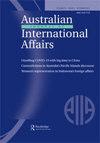Faces of ‘not knowing’ in International Relations
IF 1.8
3区 社会学
Q2 INTERNATIONAL RELATIONS
引用次数: 2
Abstract
ABSTRACTThat Indigenous diplomacies remain largely unknown to states and to disciplinary International Relations is, ultimately, a matter of choices made by those privileged in terms of the power to (re)produce social facts and common senses. Distinguishing distinct faces of ‘not knowing’ exposes ontological commitments underwriting the logics of territorially exclusive sovereign power and the knowledge practices of International Relations that, in both spheres, make Indigenous ways of knowing and being in the world seem implausible. ‘Not knowing’ in this sense is a form of rejection of knowledge and, therefore, a consequential practice which, as such, is never politically innocent. Relational autonomy raises a challenge to the rigid singularism and exclusivity of dominant ontologies—one that is rooted in long-run historical experiences of still-existing Indigenous forms of community and inter-national diplomatic practice. Among other things, it points us to more sustainable possibilities upon which to found relations between polities and reminds us that diplomacies are always plural.KEYWORDS: Relational autonomyIndigenous diplomaciesInternational Relationsknowingnot knowing Disclosure statementNo potential conflict of interest was reported by the author(s).Additional informationNotes on contributorsJ. Marshall BeierJ. Marshall Beier is Professor of Political Science at McMaster University and Editor-in-Chief of the journal Critical Studies on Security. His current research examines issues of Indigenous peoples’ global diplomacies, children’s rights, and imagined childhood as a technology of global governance. His publications include International Relations in Uncommon Places: Indigeneity, Cosmology, and the Limits of International Theory (2005, 2009), Indigenous Diplomacies, ed. (2009), Discovering Childhood in International Relations, ed. (2020), and, with Helen Berents, Children, Childhoods, and Global Politics, eds. (2023). His work has appeared in journals including Children’s Geographies, Contemporary Security Policy, Cooperation and Conflict, Global Governance, Global Responsibility to Protect, International Political Sociology, International Politics, International Studies Review, Journal of Human Rights, Security Dialogue, and Third World Quarterly.国际关系中“不知道”的面孔
摘要土著外交在很大程度上仍然不为国家和学科国际关系所知,这最终是由那些拥有(重新)产生社会事实和常识的权力的特权者做出的选择。区分“不知道”的不同面孔暴露了本体论的承诺,这些承诺支持领土排他性主权权力的逻辑和国际关系的知识实践,在这两个领域,使土著认识和存在于世界的方式似乎难以置信。从这个意义上说,“不知道”是一种对知识的拒绝,因此,是一种结果性的实践,因此,在政治上从来都不是清白的。关系自治对主导本体论的严格单一性和排他性提出了挑战,这种本体论植根于仍然存在的土著社区形式和国际外交实践的长期历史经验。除其他外,它为我们指出了建立政治关系的更可持续的可能性,并提醒我们外交永远是多元的。关键词:关系自主;本土外交;国际关系;其他信息关于贡献者的说明。马歇尔BeierJ。马歇尔·贝尔是麦克马斯特大学政治学教授,也是《安全关键研究》杂志的主编。他目前的研究考察了土著人民的全球外交、儿童权利和想象中的童年作为全球治理技术的问题。他的著作包括《罕见地区的国际关系:土著、宇宙学和国际理论的极限》(2005年、2009年)、《土著外交》(2009年)、《在国际关系中发现童年》(2020年),以及与海伦·贝伦茨合著的《儿童、童年和全球政治》(2005年、2009年)。(2023)。他的作品曾发表在《儿童地理学》、《当代安全政策》、《合作与冲突》、《全球治理》、《全球保护责任》、《国际政治社会学》、《国际政治学》、《国际研究评论》、《人权杂志》、《安全对话》和《第三世界季刊》等期刊上。
本文章由计算机程序翻译,如有差异,请以英文原文为准。
求助全文
约1分钟内获得全文
求助全文
来源期刊

Australian Journal of International Affairs
INTERNATIONAL RELATIONS-
CiteScore
3.20
自引率
13.30%
发文量
44
期刊介绍:
AJIA is the journal of the Australian Institute of International Affairs. The Institute was established in 1933 as an independent and non-political body and its purpose is to stimulate interest in and understanding of international affairs among its members and the general public. The aim of the Australian Journal of International Affairs is to publish high quality scholarly research on international political, social, economic and legal issues, especially (but not exclusively) within the Asia-Pacific region. The journal publishes research articles, refereed review essays and commentary and provocation pieces. ''Articles'' are traditional scholarly articles. ‘Review essays’ use newly published books as the basis to thematically examine current events in International Relations. The journal also publishes commentaries and provocations which are high quality and engaging pieces of commentary, opinion and provocation in a variety of styles. The Australian Journal of International Affairs aims to analyse international issues for an Australian readership and to present Australian perspectives to readers in other countries. While seeking to stimulate interest in and understanding of international affairs, the journal does not seek to promote any particular policies or approaches. All suitable manuscripts submitted are sent to two referees in a full ''double blind'' refereeing process.
 求助内容:
求助内容: 应助结果提醒方式:
应助结果提醒方式:


